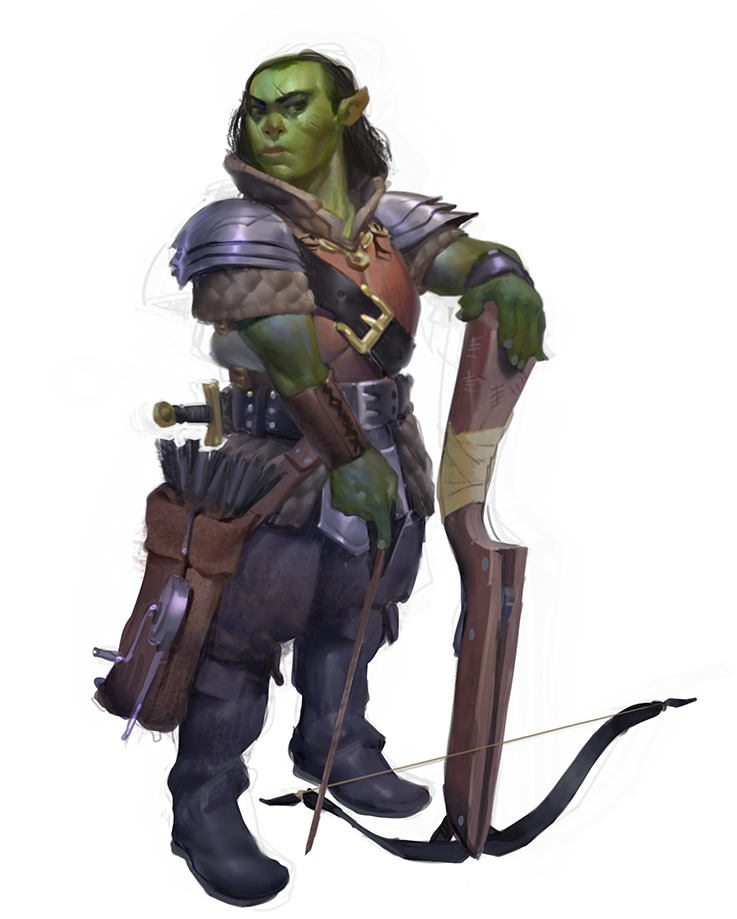Holtan
Culture
Major language groups and dialects
Most Holtans speak Holterian Orcish and a passable level of Holterian Gnoll. Those that have difficulty making the sounds of the gnoll language can sometimes have asymmetric conversations with one party speaking orcish and the other speaking gnoll.
Orcish is most common near the borders of other countries, with most outsiders having tremendous difficulty understanding or speaking the gnoll language.
Shared customary codes and values
Holtans largely trade through bartering and giving gifts, rather than using any formal currency. Though it is not necessary to immediately reciprocate gift giving, most Holtan tribes eventually give in return. It is viewed as a way to ease tensions between tribes while reducing the waste of excess supplies. Offering a gift that is refused is a somewhat shameful act, as it can be seen as trying to offload worthless items on others. This plays into Holtan politics, with powerful tribes giving gifts that the other cannot afford to refuse, or refusing a gift as an insult to the other party.
Holtans highly value pets and work animals. Most raise their camels or horses personally, and become deeply invested in their wellbeing. Many are given similar funeral rites as humanoids, at a somewhat smaller scale.
Common Etiquette rules
Religious symbols and holy books are somewhat taboo in among Holtans largely due to the fear that Holtan gnolls view gods with. As a respectful gesture to them, religion is treated as a very private and personal thing not to be advertised. Those who do are often viewed as needlessly combative and rude, or clearly an outsider to the region. Religious families or tribes have a small room dedicated to prayer, away from where visitors might see. Travelers often cordon off a section of their tents for prayer.
Common Dress code
Most Holtan clothing is made from foreign sourced cloth, bought in large bolts and made simply. Lightweight cloth is most popular, and dyed and patterned cloth is popular as a way of decoration without adding weight during long distance travels. Clothes are simply made so the cloth can be reused if necessary.
Headwear consists of turbans, keffiyeh, and wide flat brimmed hats to keep the sun off its wearer.
Art & Architecture
Holtans are so often on the move that large art pieces are simply not feasible to create. Most visual art is woven into their clothes, tents, and saddles. Poems, epics and stories are common as well, and well recorded in tomes the tribes carry with them.
Paintings and sculpture are a wondrous sight to most Holtans, and most only see them while visiting the few Holtan structures in the deserts and savannahs. With so few painters and sculptors, each piece has a vastly different style that the artist found themselves. Traders have attempted to sell imported paintings and sculptures, but generally find that the people of Holter would rather look at them and move on than worry about carrying heavy sculptures or canvases with them.
Funerary and Memorial customs
Holtans generally prefer to be cremated and spread among the sand of Holter. Funerary rites are performed on the recently deceased, and a story of their life is shared. Important and respected members of a tribe may have their story chronicled and written down, but most are simply shared among those who are present. The deceased's favored pet or animal are often kept present through the entire ceremony.
There is a tradition among some Holtan tribes where funerals always happen early in the morning. When the tribe continues their travels, they walk through where the ash was spread. It is believed that the deceased is with them on all their future travels, protecting them.
Diverged ethnicities
Related Organizations
Languages spoken



